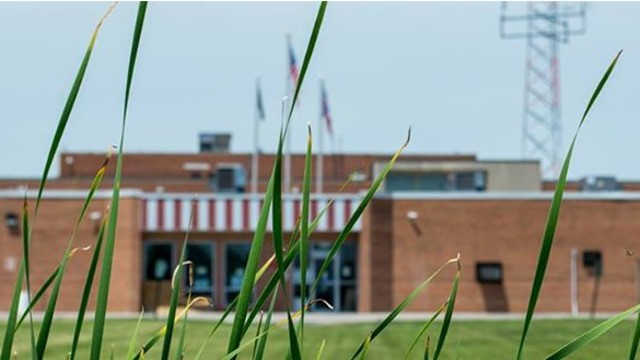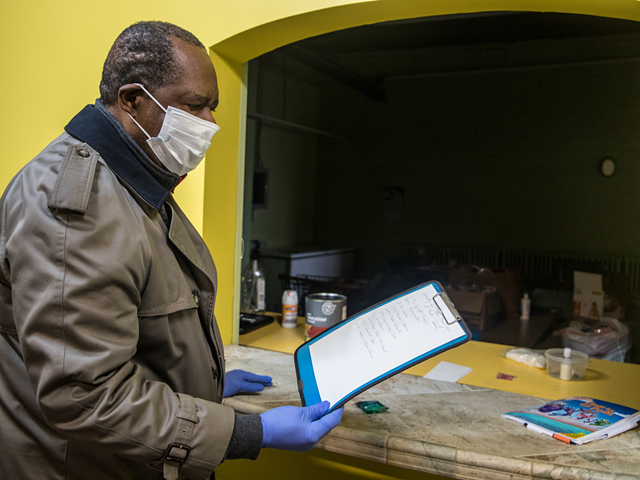The incarcerated men of Marion Correctional Institution in Ohio began a food strike on May 6, protesting deteriorating meal services as COVID-19 continues to sweep through the prison. Marion is home to one of the most concentrated coronavirus outbreaks in the U.S.
As calls for mass release grew louder in the state capital, the 86 men held in 5-Dorm announced a food strike, refusing to eat the two meals provided by the prison staff each day. According to state records, 1,353 inmates and 175 staff members at Marion have tested positive for COVID-19, and 12 inmates and one staff member have died.
Austin Cox, 22, incarcerated at Marion since November 2019, says that inmates were still being served three meals when quarantine procedures began in late March: a bagged breakfast, a hot lunch and a bagged dinner. Now, daily meals have dwindled to a hot lunch (now called “brunch”) and a bagged dinner (like a bologna sandwich). A recent video on social media showed what a typical brunch looks like: cereal, gravy and two biscuits. What makes it “brunch,” according to the inmate on video, is the fish patty on top.
The food strike takes aim at the paltry nutrition and the broader encroachment on inmates' health and safety as the spread of the disease continues.“We don't deserve to be treated like we're not people just because we're incarcerated," Cox says in a phone interview. "They're treating us like we're animals. I look at it as: We don't deserve to be treated like that here. We're still people.”
Cox has so far tested negative for COVID-19. Twice. He's one of only six inmates in his dorm who still haven't caught the disease. He washes his hands, he sneezes into his shirt. He tries to stay away from people's faces, but he's not long on options to protect himself.
The bunks in Marion's dorms are maybe four feet apart from one another, Cox ballparks, so there's really no chance to match the physical distancing that's been mandated through public policy or social norm elsewhere in society. “We have very little space,” he says.
Despite the relatively increased scrutiny on how prisons are handling the health and safety of incarcerated individuals, Cox says that the atmosphere is fairly noncommittal. Staff members ask if inmates would like to wear face masks. But daily temperature checks stopped on April 27. The food strike is meant to sharpen the focus on this problem. It's not unique to Marion, but that prison in the central, rural flatlands of the state is where certain political attention in Ohio has gathered in recent weeks.
"We all kind of came together as a group, sticking together," Cox says. "We're supposed to stick together in here."
The COVID-19 pandemic has shined a light on prisons to a degree that's rare for mainstream news media coverage. These facilities are obvious hotbeds for contagious disease. In Ohio, prison inmates and staff members comprise 20 percent of the state’s COVID-19 cases. Elsewhere, in Arkansas, the ratio is further distorted. Many inmates have filed emergency motions for release, requesting some sort of judicial reprieve and a temporary escape from the confines of prison.
“They're treating us like we're animals,” Cox says. “They're kind of just keeping us contained in a very confined space all together, and they're expecting this not to spread when there's already been 10 inmates who've died in this facility from COVID-19. So, to not stop it from spreading, they're going to keep people who are negative with people who are positive? That belittles me. I don't understand their thinking process. How is that smart in any way, shape or form?”
With little in the way of relief, he adds that a general food strike is one of the few options available. Now, the men in 5-Dorm are trying to share the message to others at Marion. But with very little interaction among dorms and cell blocks, due to quarantine protocol, that’s no small task.
The verbiage here is important, too. This is a “food strike,” meaning that participating inmates in 5-Dorm and elsewhere are refusing the prison's meals. (A “hunger strike” is when people stop eating at all, starving themselves.) Inmates in 5-Dorm are cooking their own meals from products purchased through the commissary. On the first day of the strike, Cox and others cooked rice and soup for the other guys who didn't go down to the chow hall.
“Everybody got to eat a bowl,” he says.
Earlier this year, the ODRC distributed a memo of “Hunger Strike Facts” to inmates, a reiteration of policies first enacted in 2017. According to the memo, “If you refuse 9 documented meals, you are on hunger strike. You will be moved to P1 in a safe cell. You will have labs drawn.”
Azzurra Crispino, the wife of a Marion Correctional inmate and a prison abolition advocate, says that the memo is one of the more “draconian” stances toward hunger strikes that she's seen among U.S. state prison systems.
“Your concerns will not be addressed while you are refusing meals,” the memo states. “You will not receive a bed move. … Forced medical care can and will be utilized, if necessary, to ensure health safety and prevent irreversible damage to the body or death. … You will not receive any special or expedited treatment because you are on hunger strike.”
Kevin Keith, 59, is another incarcerated man participating in the food strike. His 1994 murder conviction remains the subject of a habeas petition in federal court in Cleveland, and, in March of this year, he had filed an emergency motion for release, citing an “unprecedented health emergency” at Marion. A federal judge wrote: “The Court is mindful that circumstances faced by this country in general, and [Keith] as well as other prisoners specifically, are certainly extraordinary. But [Keith] has not shown his particular circumstances to be ‘exceptional.'”
Since then, Keith has tested positive for COVID-19.
His brother, Charles Keith, is a longtime advocate for Kevin's innocence and for the abolition of the death penalty in Ohio. He says he tried to talk Kevin out of the food strike for his own safety, but Kevin insisted.Charles says that Kevin made it clear during a May 5 phone call, the night before the food strike began, saying: “'You've got to understand: When you're behind bars like this, everything's on principle.'”






